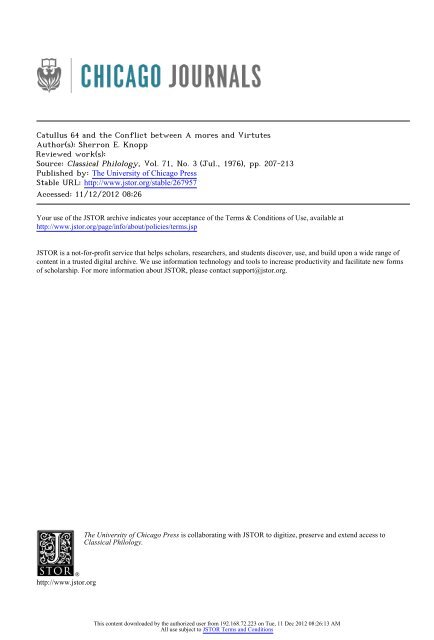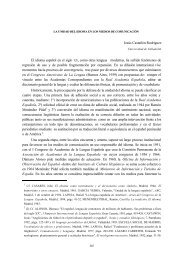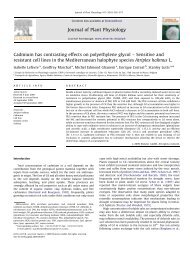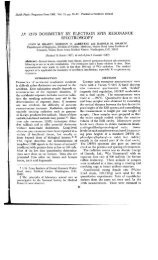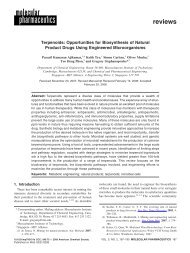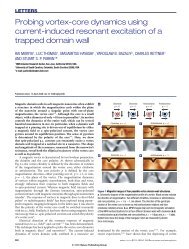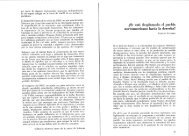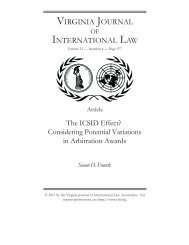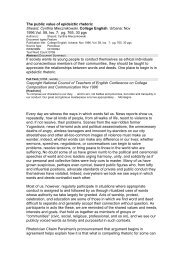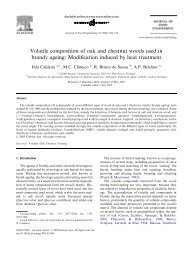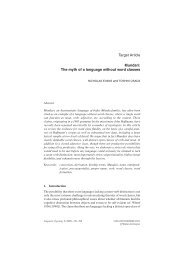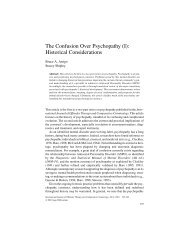Catullus 64 and the Conflict between A mores and Virtutes
Catullus 64 and the Conflict between A mores and Virtutes
Catullus 64 and the Conflict between A mores and Virtutes
Create successful ePaper yourself
Turn your PDF publications into a flip-book with our unique Google optimized e-Paper software.
<strong>Catullus</strong> <strong>64</strong> <strong>and</strong> <strong>the</strong> <strong>Conflict</strong> <strong>between</strong> A <strong>mores</strong> <strong>and</strong> <strong>Virtutes</strong><br />
Author(s): Sherron E. Knopp<br />
Reviewed work(s):<br />
Source: Classical Philology, Vol. 71, No. 3 (Jul., 1976), pp. 207-213<br />
Published by: The University of Chicago Press<br />
Stable URL: http://www.jstor.org/stable/267957 .<br />
Accessed: 11/12/2012 08:26<br />
Your use of <strong>the</strong> JSTOR archive indicates your acceptance of <strong>the</strong> Terms & Conditions of Use, available at .<br />
http://www.jstor.org/page/info/about/policies/terms.jsp<br />
.<br />
JSTOR is a not-for-profit service that helps scholars, researchers, <strong>and</strong> students discover, use, <strong>and</strong> build upon a wide range of<br />
content in a trusted digital archive. We use information technology <strong>and</strong> tools to increase productivity <strong>and</strong> facilitate new forms<br />
of scholarship. For more information about JSTOR, please contact support@jstor.org.<br />
.<br />
http://www.jstor.org<br />
The University of Chicago Press is collaborating with JSTOR to digitize, preserve <strong>and</strong> extend access to<br />
Classical Philology.<br />
This content downloaded by <strong>the</strong> authorized user from 192.168.72.223 on Tue, 11 Dec 2012 08:26:13 AM<br />
All use subject to JSTOR Terms <strong>and</strong> Conditions
CATULLUS <strong>64</strong> AND THE CONFLICT BETWEEN<br />
A MORES AND VIRTUTES<br />
SHERRON E. KNOPP<br />
C ATULLUS <strong>64</strong> is a complex <strong>and</strong> puzzling poem.' It purports to be a<br />
marriage song for Peleus <strong>and</strong> Thetis, but contains at its center <strong>the</strong><br />
tragic love of Theseus <strong>and</strong> Ariadne. It hails <strong>the</strong> age of heroes, but<br />
depicts heroic deeds which are less than admirable. Interpretations of <strong>the</strong><br />
poem tend to emphasize ei<strong>the</strong>r one or <strong>the</strong> o<strong>the</strong>r of <strong>the</strong>se aspects, making <strong>the</strong><br />
<strong>the</strong>me ei<strong>the</strong>r a contrast <strong>between</strong> happy <strong>and</strong> unhappy love or an ironic<br />
comment on <strong>the</strong> heroic age.2 I would like to suggest, however, that <strong>the</strong><br />
<strong>the</strong>me is not a<strong>mores</strong> or uirtutes, but <strong>the</strong> conflict <strong>between</strong> <strong>the</strong> two. The<br />
marriage of Peleus <strong>and</strong> Thetis is threatened by it, <strong>the</strong> story of Theseus <strong>and</strong><br />
Ariadne illustrates it, <strong>and</strong> <strong>the</strong> prophecy about Achilles <strong>and</strong> Po]vxena warns<br />
of it.<br />
The story of Theseus <strong>and</strong> Ariadne at <strong>the</strong> center of <strong>the</strong> poem illustrates<br />
<strong>the</strong> conflict most clearly. Instead of narrating it chronologically, <strong>Catullus</strong><br />
juxtaposes events of <strong>the</strong> past, present, <strong>and</strong> future in a series of tableaux<br />
which alternate Theseus <strong>and</strong> his magnae uirtutes with Ariadne <strong>and</strong> her<br />
indomiti furores. He thus creates a pattern in which love <strong>and</strong> heroism are<br />
as carefully balanced against each o<strong>the</strong>r as masculine Roman Septimius <strong>and</strong><br />
feminine Greek Acme are in poem 45:<br />
Ariadne on shore (betrayed) 53-70 (17 lines) passion<br />
Theseus in Crete 71-123 (52 lines) heroism<br />
Ariadne's lament 124-201 (77 lines) passion vs. heroism<br />
Theseus in A<strong>the</strong>ns 202-250 (48 lines) heroism<br />
Iacchus on shore (seeking Ariadne) 251-<strong>64</strong> (13 lines) passion<br />
Ariadne st<strong>and</strong>s out as a sympa<strong>the</strong>tic figure in this section, <strong>and</strong> no doubt<br />
her plight appealed to <strong>Catullus</strong> because of his relationship with Lesbia; but<br />
he devotes equal space to Theseus, whose deeds are placed among <strong>the</strong><br />
uirtutes of heroes by <strong>the</strong> opening lines of <strong>the</strong> story: "haec uestis priscis<br />
hominum uariata figuris / heroum mira uirtutes indicat arte" (50-51).<br />
Although <strong>the</strong> unexpected portrait of Ariadne's desolation which follows<br />
does not make Theseus an admirable figure, her plight reflects on him as a<br />
1. All quotations of <strong>Catullus</strong> will be from <strong>the</strong> text of R. A. B. Mynors (Oxford, 1958; repr. 1972).<br />
2. For <strong>the</strong> former see Clyde Murley, "The Structure <strong>and</strong> Proportion of <strong>Catullus</strong> LXIV," TAPA<br />
68 (1937): 305-317; Friedrich Klingner, Catulls Peleus-Epos (Munich, 1956). Those who discuss <strong>the</strong><br />
love <strong>the</strong>me often read <strong>the</strong> poem as a personal document in which <strong>Catullus</strong> identifies himself with<br />
Ariadne <strong>and</strong> describes Peleus <strong>and</strong> Thetis as <strong>the</strong> ideal he wished for himself <strong>and</strong> Lesbia. See especially<br />
P. W. Harkins, "Autoallegory in <strong>Catullus</strong> 63 <strong>and</strong> <strong>64</strong>," TAPA 90 (1959): 102-116; M. C. J. Putnam,<br />
"The Art of <strong>Catullus</strong> <strong>64</strong>," HSCP 65 (1961): 165-205; D. F. S. Thomson, "Aspects of Unity in Catul-<br />
lus <strong>64</strong>," CJ 57 (1961): 49-57; M. L. Daniels, "Personal Revelation in <strong>Catullus</strong> LXIV," CJ 62 (1967):<br />
351-56. For <strong>the</strong> view that <strong>the</strong> poem is an ironic commentary on <strong>the</strong> heroic age, see T. E. Kinsey,<br />
"Irony <strong>and</strong> Structure in <strong>Catullus</strong> <strong>64</strong>," Latomus 24 (1965): 911-31; <strong>and</strong> <strong>the</strong> excellent studies by<br />
Leo C. Curran, "<strong>Catullus</strong> <strong>64</strong> <strong>and</strong> <strong>the</strong> Heroic Age," YCIS 21 (1969): 171-92; <strong>and</strong> J. C. Bramble,<br />
"Structure <strong>and</strong> Ambiguity in <strong>Catullus</strong> LXIV," PCPhS 196=n.s. 16 (1970): 22-41.<br />
207<br />
This content downloaded by <strong>the</strong> authorized user from 192.168.72.223 on Tue, 11 Dec 2012 08:26:13 AM<br />
All use subject to JSTOR Terms <strong>and</strong> Conditions
208 SHERRON E. KNOPP<br />
lover, not as a hero. Moreover, <strong>Catullus</strong> judges him only immemor (58) as<br />
he flees from Ariadne, implying perhaps that a<strong>mores</strong> simply do not claim<br />
Theseus' first attention.<br />
His allegiances, in contrast to Ariadne's, are revealed in lines 71-123,<br />
when ferox Theseus comes to <strong>the</strong> l<strong>and</strong> of <strong>the</strong> iniustus rex <strong>and</strong> provides an<br />
example of <strong>the</strong> uirtutes alluded to in line 51. The injustice is <strong>the</strong> slaughter<br />
of <strong>the</strong> electi iuuenes <strong>and</strong> decus innuptarum of A<strong>the</strong>ns to provide a daps for<br />
<strong>the</strong> Minotaur (78-79); <strong>and</strong> by his word choice <strong>Catullus</strong> makes it an ironic<br />
mockery of both love <strong>and</strong> heroism. The word daps, as Fordyce points out,<br />
has solemn religious overtones,3 <strong>and</strong> <strong>Catullus</strong> applies it in line 304 to <strong>the</strong><br />
wedding feast of Peleus <strong>and</strong> Thetis, who are <strong>the</strong>mselves an electus iuuenis<br />
(cf. 4) <strong>and</strong> a decus innuptarum (27-30). That Theseus' heroum uirtutes in remedying<br />
<strong>the</strong> injustice of Minos are above reproach <strong>Catullus</strong> makes clear by<br />
spelling out his motivation, a thoroughly admirable pietas toward his fellow<br />
citizens: "ipse suum Theseus pro caris corpus A<strong>the</strong>nis / proicere optauit<br />
potius quam talia Cretam / funera Cecropiae nec funera portarentur"<br />
(81-83). In lines 202-250, he will extend <strong>the</strong> reader's view of Theseus' pietas<br />
by showing that it also includes his fa<strong>the</strong>r.<br />
Minos' world, unlike Theseus', is not one of magnae uirtutes <strong>and</strong> pietas.<br />
In fact, everything connected with him seems ironically phrased to emphasize<br />
his lack of heroic stature <strong>and</strong> to contrast him with Theseus. Thus, when<br />
Theseus arrives "magnanimum ad Minoa ... sedesque superbas" (85), superbas<br />
is not unexpected as an attribute in speaking of Minos, while magnanimum,<br />
which is usually explained as a stock epic epi<strong>the</strong>t,4 operates with <strong>the</strong><br />
same ironic force as daps does in <strong>the</strong> reference to <strong>the</strong> Minotaur: Minos is no<br />
more magnanimus than <strong>the</strong> Minotaur's meal is a daps. As a member of this<br />
world, Ariadne can quite easily fall in love with her fa<strong>the</strong>r's enemy. Not<br />
subject to <strong>the</strong> pietas which prompts Theseus to sacrifice himself pro caris<br />
A<strong>the</strong>nis, she, filia, can leave <strong>the</strong> genitoris uultus <strong>and</strong> <strong>the</strong> complexus matris<br />
(117-18).5 To <strong>the</strong>se things, motivated bv personal passion instead of heroic<br />
pietas, Ariadne prefers <strong>the</strong> dulcis amor of Theseus (120), much like Acme in<br />
poem 45: "uno in Septimio fidelis Acme / facit delicias libidinesque" (23-24).<br />
However, it is a precarious position to opt for when, unlike Septimius who<br />
prefers Acme to Britains <strong>and</strong> Syrias, Theseus, ". . . saeuum cupiens contra<br />
contendere monstrum / aut mortem appeteret ... aut praemia laudis"<br />
(101-2). Thus, both characters are flawed. And both are admirable. Ariadne's<br />
lack of pietas does not negate <strong>the</strong> value of her love any more than Theseuls'<br />
lack of personal passion negates his heroism.<br />
In <strong>the</strong> center of <strong>the</strong> Theseus-Ariadne story, Ariadne's lament articulates<br />
<strong>the</strong> tragic conflict <strong>between</strong> love <strong>and</strong> heroism, as Theseus, not hero here but<br />
coniunx (123), disappears over <strong>the</strong> sea. As coniunx, Theseus is perfidus (132)<br />
3. C. J. Fordyce, <strong>Catullus</strong>: A Commentary (Oxford, 1961), p. 289.<br />
4. Robinson Ellis, A Commentary on CatuZluss2 (Oxford, 1889), p. 299; Wilhelm Kroll, ed., C.<br />
Valerius <strong>Catullus</strong> (Leipzig, 1922), p. 156; E. T. Merrill, ed., <strong>Catullus</strong> (Boston, 1893; repr. Cambridge,<br />
Mass., 1965), p. 139; Fordyce, p. 290. Kenneth Quinn, <strong>Catullus</strong>: The Poems (London, 1970), p. 315,<br />
observes that <strong>the</strong> word is used ironically but does not explain how.<br />
5. Fordyce, p. 294, notes also how <strong>the</strong> juxtaposition of genitorisfilia "emphasizes <strong>the</strong> unnaturalness<br />
of <strong>the</strong> act."<br />
This content downloaded by <strong>the</strong> authorized user from 192.168.72.223 on Tue, 11 Dec 2012 08:26:13 AM<br />
All use subject to JSTOR Terms <strong>and</strong> Conditions
CATULLUS <strong>64</strong> 209<br />
<strong>and</strong> has neglected <strong>the</strong> numen diuum (134); but bv <strong>the</strong> words of her reproach,<br />
Ariadne recalls also her own shortcoming: ". . . et potius germanum amittere<br />
creui, / quam tibi fallaci supremo in tempore dessem" (150-51). She re-<br />
proaches Theseus for lacking personal passion <strong>and</strong> cannot comprehend his<br />
less personal, less passionate code of pietas:<br />
quaenam te genuit sola sub rupe leaena,<br />
quod mare conceptum spumantibus exspuit undis,<br />
quae Syrtis, quae Scylla rapax, quae uasta Carybdis,<br />
talia qui reddis pro dulci praemia uita?<br />
[154-571<br />
In this case personal passion will wreak havoc on heroic pietas; for when she<br />
prays for vengeance, <strong>the</strong> Eumenides grant it.<br />
Lines 202-250, describing Theseus' return to A<strong>the</strong>ns, balance lines 76-123,<br />
as heroism <strong>and</strong> pietas are once again emphasized <strong>and</strong> implicitlv opposed to<br />
passion. In a flashback <strong>the</strong> poet recalls Theseus' departure from A<strong>the</strong>ns <strong>and</strong><br />
from Aegeus. Aegeus' speech on this occasion reveals <strong>the</strong> kind of pietas<br />
which <strong>Catullus</strong> in poem 72 considers to be <strong>the</strong> highest emotion he can offer<br />
Lesbia ("pater ut gnatos diligit et generos," 4) <strong>and</strong> which is obviously<br />
lacking in Ariadne's family. Aegeus' acceptance of Theseus' departure,<br />
because his son's feruida uirtus requires it (218), perhaps hints that Theseus<br />
overdoes <strong>the</strong> heroic, just as Ariadne ab<strong>and</strong>ons herself too completely to<br />
passion; but Aegeus is not criticizing Theseus. Feruida uirtus is a positive<br />
ideal <strong>and</strong> it does not conflict with <strong>the</strong> pietas <strong>between</strong> fa<strong>the</strong>r <strong>and</strong> son. Thus,<br />
although Theseus forgets <strong>the</strong> promises of passion to Ariadne, it takes <strong>the</strong><br />
interference of <strong>the</strong> gods to make him forget <strong>the</strong> promises to his fa<strong>the</strong>r<br />
("haec m<strong>and</strong>ata prius constanti mente tenentem," 238). By formulating<br />
Theseus' punishment in terms of his offense, that is, in terms of his mind-<br />
fulness <strong>and</strong> unmindfulness of particular values, <strong>Catullus</strong> crystallizes <strong>the</strong><br />
conflict <strong>between</strong> Theseus <strong>and</strong> Ariadne: "sic funesta domus ingressus tecta<br />
paterna / morte ferox Theseus, qualem Minoidi luctum / obtulerat mente<br />
immemori, talem ipse recepit" (246-48). Ferox recalls line 73 <strong>and</strong> Theseus'<br />
heroic trip to <strong>the</strong> palace of <strong>the</strong> unjust king, <strong>and</strong> because as a ferox he was<br />
unmindful of Ariadne's passion, vengeance destroys things of which he was<br />
mindful.<br />
The final segment of <strong>the</strong> Theseus-Ariadne story balances <strong>the</strong> opening<br />
scene in which Ariadne stood "indomitos in corde gerens . . . furores" (54)<br />
<strong>and</strong> "saxea ut effigies bacchantis" (61), while Theseus, unable to return her<br />
love in kind, fled. In <strong>the</strong> last scene Iacchus, leading his bacchantes, "quae<br />
tum alacres passim lVmphata mente furebant" (254), comes seeking Ariadne,<br />
incensus amore (253), <strong>and</strong> passion will meet passion. As Putnam has ob-<br />
served,6 Ariadne's eheu even sounds like Iacchus' eu/ioe. These two portraits<br />
of unrestrained passion thus frame <strong>the</strong> two balanced portraits of Theseus'<br />
disciplined uirtutes, while in <strong>the</strong> center Ariadne's lament reveals <strong>the</strong> disas-<br />
trous conflict <strong>between</strong> <strong>the</strong>m. However, although <strong>the</strong> story on <strong>the</strong> bedspread<br />
contains a sober warning about a<strong>mores</strong> <strong>and</strong> uirtutes, its implied resolution<br />
6. "The Art of <strong>Catullus</strong> <strong>64</strong>," p. 187.<br />
This content downloaded by <strong>the</strong> authorized user from 192.168.72.223 on Tue, 11 Dec 2012 08:26:13 AM<br />
All use subject to JSTOR Terms <strong>and</strong> Conditions
210 SHERRON E. KNOPP<br />
in favor of passionate love makes it not inappropriate to grace <strong>the</strong> marriage<br />
bed of Peleus <strong>and</strong> Thetis. Moreover, <strong>the</strong> first fifty lines of <strong>the</strong> poem show<br />
that <strong>the</strong> warning itself is appropriate for <strong>the</strong> bridal pair.<br />
Peleus enters <strong>the</strong> poem as one of <strong>the</strong> lecti iuuenes (4) on <strong>the</strong> expedition<br />
of <strong>the</strong> Argonauts. Like Theseus, he is a hero. Moreover, he sails on a ship<br />
built bv A<strong>the</strong>na (8-9) <strong>and</strong> thus voyages under <strong>the</strong> care of <strong>the</strong> same goddess<br />
to whom Aegeus entrusted Theseus. Thetis appears in <strong>the</strong> midst of <strong>the</strong> sea,<br />
one of a number of nymphs "nutricum tenus exstantes e gurgite cano" (18)-<br />
a description echoed vaguely later when Ariadne st<strong>and</strong>s in <strong>the</strong> water on <strong>the</strong><br />
shore, "non contecta leui uelatum pectus amictu, / non tereti strophio<br />
lactentis uincta papillas" (<strong>64</strong>-65). In both cases <strong>the</strong> sea innocently provides<br />
<strong>the</strong> backdrop.7 It bears <strong>the</strong> incursion of <strong>the</strong> Argo ("illa [sc. carina] rudem<br />
cursu prima imbuit Amphitriten," 11), <strong>and</strong>, indifferent to grief, it sports<br />
with Ariadne's clo<strong>the</strong>s ("omnia quae toto delapsa e corpore passim / ipsius<br />
ante pedes fluctus salis alludebant," 66-67). The descriptions suggest<br />
tentatively that Peleus <strong>and</strong> Thetis have <strong>the</strong> potential to become ano<strong>the</strong>r<br />
Theseus <strong>and</strong> Ariadne.<br />
For <strong>the</strong> moment, however, any sinister implications remain hidden. The<br />
tone of <strong>the</strong> passage reflects only <strong>the</strong> excitement of first-time experience. The<br />
ship initiates <strong>the</strong> sea, <strong>and</strong> <strong>the</strong> image of pines from Mt. Pelion swimming<br />
through <strong>the</strong> waves emphasizes <strong>the</strong> strange wonder of it. In <strong>the</strong> meeting of<br />
men <strong>and</strong> nymphs, <strong>the</strong> nymphs stare at <strong>the</strong> ship, a monstrum, with wonder,<br />
admirantes (15), while <strong>the</strong> mortals, "illa, atque alia, . . luce"<br />
(16), behold sea goddesses with <strong>the</strong>ir own eyes. Even this mood, emphasizing<br />
vision scarcely to be believed, will be echoed ironically in <strong>the</strong> strained verbs<br />
of seeing applied to Ariadne, who also will scarcely believe her eyes: "necdum<br />
etiam sese quae uisit uisere credit" (55). But that connection, like <strong>the</strong><br />
o<strong>the</strong>rs, will not occur to <strong>the</strong> reader until later.<br />
For <strong>the</strong> present, <strong>the</strong> marvelous journey provides <strong>the</strong> occasion for Peleus'<br />
more marvelous love. The description of it, insofar as it touches on magnae<br />
uirtutes, implicitly pertains to Peleus, but <strong>the</strong> first explicit mention of him<br />
associates him with love: "tum Thetidis Peleus incensus fertur amore" (19).<br />
Lines 22-30, wherein <strong>Catullus</strong> apostrophizes Peleus <strong>and</strong> <strong>the</strong> age of heroes,<br />
do not have to be interpreted ironically to be intelligible, for <strong>Catullus</strong><br />
praises Peleus particularly as a lover:<br />
Thessaliae columen Peleu, cui luppiter ipse,<br />
ipse suos diuum genitor concessit a<strong>mores</strong>;<br />
tene Thetis tenuit pulcerrima Nereine?<br />
tene suam Tethys concessit ducere neptem,<br />
Oceanusque, mari totum qui amplectitur orbem? [26-30]<br />
At <strong>the</strong> same time, <strong>the</strong> epi<strong>the</strong>t Thessaliae columen associates Peleus with<br />
heroism <strong>and</strong> with <strong>the</strong> code of conduct held by Theseus. The reader cannot<br />
7. For a good analysis of <strong>the</strong> sea imagery, see Curran, "<strong>Catullus</strong> <strong>64</strong> <strong>and</strong> <strong>the</strong> Heroic Age," pp. 176-<br />
77; <strong>and</strong> Richard J. Wolfe, S.J., "Imagery in <strong>Catullus</strong> <strong>64</strong>," CW 62 (1969): 297-300.<br />
This content downloaded by <strong>the</strong> authorized user from 192.168.72.223 on Tue, 11 Dec 2012 08:26:13 AM<br />
All use subject to JSTOR Terms <strong>and</strong> Conditions
CATULLUS <strong>64</strong> 211<br />
know vet what danger to love this implies; but <strong>Catullus</strong> does, <strong>and</strong> reveals<br />
it in <strong>the</strong> story of Theseus <strong>and</strong> Ariadne.<br />
For Peleus <strong>and</strong> Thetis, however, things may turn out differentlv. Although<br />
Peleus meets Thetis, as Theseus met Ariadne, on a heroic quest, he is, like<br />
Ariadne (97) <strong>and</strong> Iacchus (253), incensus amore (19). Moreover, <strong>the</strong> preparations<br />
for <strong>the</strong> wedding in <strong>the</strong> surrounding countryside (31-49) suggest a<br />
society which ab<strong>and</strong>ons duty to indulge passion: "squalida desertis rubigo<br />
infertur aratris" (42). By <strong>the</strong> subsequent description of palace opulence,<br />
<strong>Catullus</strong> creates for Peleus an ambience in which love can flourish.<br />
On <strong>the</strong> o<strong>the</strong>r side of <strong>the</strong> Theseus-Ariadne story, after <strong>the</strong> human guests<br />
leave <strong>and</strong> <strong>the</strong> divine guests arrive, Chiron <strong>and</strong> Penios offer <strong>the</strong>ir gifts of<br />
flowers <strong>and</strong> trees. Then a shadow falls, for <strong>the</strong> first time directly, on <strong>the</strong><br />
marriage. Prome<strong>the</strong>us appears in <strong>the</strong> midst of celebration, "extenuata<br />
gerens ueteris uestigia poenae" (295), while Apollo <strong>and</strong> Diana conspicuously<br />
absent <strong>the</strong>mselves. Although manv critics refer to o<strong>the</strong>r accounts of <strong>the</strong><br />
myth to explain this passage,8 <strong>the</strong> poem itself provides a sufficient context<br />
for its interpretation. Since <strong>Catullus</strong> avoids anv negative allusion to <strong>the</strong><br />
prior association of Thetis <strong>and</strong> Jupiter in <strong>the</strong> first part of <strong>the</strong> poem, underscoring<br />
only <strong>the</strong> good fortune of Peleus, to whom Jupiter himself suos...<br />
concessit a<strong>mores</strong> (26-27), one does not need to connect Prome<strong>the</strong>us with <strong>the</strong><br />
revelation that Thetis would bear a son greater than his fa<strong>the</strong>r. The Parcae<br />
reveal that anvway. <strong>Catullus</strong> has a different function for Prome<strong>the</strong>us: <strong>the</strong><br />
traces of old wounds recall that <strong>the</strong> relationship <strong>between</strong> gods <strong>and</strong> men has<br />
had a stormy historv. Likewise, <strong>the</strong> absence of Apollo <strong>and</strong> Diana reveals<br />
that even in this happy moment at least one god, toge<strong>the</strong>r with his sister,<br />
scorned Pelets, "nec Thetidis taedas uoluit celebrare iugalis" (302). The<br />
dark suggestions accentuate <strong>the</strong> precariousness of <strong>the</strong> balance in which<br />
Peleus <strong>and</strong> Thetis are poised a balance upset by Theseus, but one which<br />
can be maintained with <strong>the</strong> help of <strong>the</strong> gods.<br />
The wedding song of <strong>the</strong> Parcae, like <strong>the</strong> story of Theseus <strong>and</strong> Ariadne,<br />
once again warns of conflict, but it also reflects <strong>the</strong> whole poem in miniature:<br />
three stanzas extoll <strong>the</strong> love of Peleus <strong>and</strong> Thetis; seven foretell <strong>the</strong> increasingly<br />
bloody deeds of Achilles, climaxed by <strong>the</strong> bruLtal sacrifice of<br />
Polvxena; <strong>and</strong> <strong>the</strong> final two return to <strong>the</strong> love of Peleus <strong>and</strong> Thetis. Thus<br />
<strong>the</strong> story of Achilles <strong>and</strong> Polyxena is embedded in <strong>the</strong> praises of love, just<br />
as <strong>the</strong> story of Ariadne is framed on a larger scale by <strong>the</strong> wedding.<br />
The Parcae begin by verifying what <strong>Catullus</strong> implied in <strong>the</strong> beginning<br />
of <strong>the</strong> poem, that <strong>the</strong> love of Peleus <strong>and</strong> Thetis is as near to an ideal as<br />
possible: "nulla domus tales umquam contexit a<strong>mores</strong>, / nullus amor tali<br />
coniunxit foedere amantes, ,/ qualis adest Thetidi, qualis concordia Peleo"<br />
(334-36). Fur<strong>the</strong>rmore, <strong>the</strong> song of <strong>the</strong> Parcae is ueridicum oraculum (326),<br />
a thing "perfidiae quod post nulla arguet aetas" (322); <strong>and</strong> <strong>Catullus</strong> emphasizes<br />
<strong>the</strong>ir veracity from <strong>the</strong> moment he introduces <strong>the</strong>m:9 "ueridicos<br />
8. See especially Curran, "<strong>Catullus</strong> <strong>64</strong> <strong>and</strong> <strong>the</strong> Heroic Age," <strong>and</strong> Bramble, "Structure <strong>and</strong> Ambi-<br />
guity." For <strong>the</strong> various accounts of <strong>the</strong> myth, see R. Reitzenstein, "Die Hochzeit des Peleus und<br />
der Thetis," Hermes 35 (1900): 73-105.<br />
9. Cf. Bramble, "Structure <strong>and</strong> Ambiguity," p. 28, who makes <strong>the</strong> same point for different reasons.<br />
This content downloaded by <strong>the</strong> authorized user from 192.168.72.223 on Tue, 11 Dec 2012 08:26:13 AM<br />
All use subject to JSTOR Terms <strong>and</strong> Conditions
212 SHERRON E. KNOPP<br />
Parcae coeperunt edere cantus" (306). At <strong>the</strong> same time as <strong>the</strong>y corroborate<br />
<strong>Catullus</strong>' opinion of Peleus' good fortune, <strong>the</strong> Parcae offer an even stronger<br />
warning for him than <strong>the</strong> marriage bedspread; <strong>and</strong> <strong>the</strong> first two lines of<br />
<strong>the</strong>ir song explain <strong>the</strong> need for <strong>the</strong> warning: "o decus eximium magnis<br />
uirtutibus augens, / Emathiae tutamen, Opis carissime nato" (323-24).<br />
Emathiae tultamen picks up <strong>the</strong> epi<strong>the</strong>t Thessaliae columen with which<br />
<strong>Catullus</strong> introduced Peleus <strong>and</strong> recalls his status as a hero. More important,<br />
he is called "decus eximium magnis uirtutibus augens." On <strong>the</strong> face of it,<br />
<strong>the</strong> address honors him, <strong>the</strong> ideal can be ennobling; but <strong>the</strong> poem has<br />
shown that heroism does not mix well with love, <strong>and</strong> <strong>the</strong> Parcae will make<br />
<strong>the</strong> point unmistakably clear by showing <strong>the</strong> ultimate progress of uirtutes<br />
at <strong>the</strong> cost of a<strong>mores</strong>.<br />
The stanzas about Achilles begin neutrally enough with a description of<br />
his courage <strong>and</strong> swiftness, followed by a reference to <strong>the</strong> Trojan War, in<br />
which "non illi quisquam bello se conferet heros" (343). The third stanza<br />
ironically places his "egregiae uirtutes claraque facta" (348) next to <strong>the</strong><br />
weeping mo<strong>the</strong>rs whose sons he will have killed; <strong>the</strong> fourth chronicles <strong>the</strong><br />
slaughter as Achilles proceeds "uelut densas praecerpens messor aristas"<br />
(353), <strong>and</strong> <strong>the</strong> fifth again ironically refers to heaps of corpses choking <strong>the</strong><br />
rivers as magnae uirtutes (357). The last two stanzas climax <strong>the</strong> carnage<br />
with a description of Polyxena, a testis to <strong>the</strong> deeds of <strong>the</strong> hero (362), whose<br />
innocent blood is required to crown <strong>the</strong>m. All toge<strong>the</strong>r <strong>the</strong>y make a grisly<br />
portrait of magnae uirtutes.<br />
Immediately following <strong>the</strong> vision of <strong>the</strong> truncum corpus of Polyxena atop<br />
<strong>the</strong> grave of Achilles, <strong>the</strong> idvllic love of Peleus <strong>and</strong> Thetis is recalled:<br />
"quare agite optatos animi coniungite a<strong>mores</strong>. / accipiat coniunx felici<br />
foedere diuam, / dedatur cupido iam dudum nupta marito" (372-74).<br />
The effect is <strong>the</strong> same as that produced earlier when <strong>Catullus</strong> followed <strong>the</strong><br />
promise of heroum. . . uirtutes with <strong>the</strong> desolation of Ariadne, <strong>and</strong> <strong>the</strong><br />
purpose is <strong>the</strong> same. Although Peleus <strong>and</strong> Thetis for <strong>the</strong> moment lack<br />
nothing in <strong>the</strong>ir love, <strong>the</strong>y could end up as Achilles <strong>and</strong> Polyxena will, or as<br />
Theseus <strong>and</strong> Ariadne have-or, on <strong>the</strong> o<strong>the</strong>r h<strong>and</strong>, as Ariadne <strong>and</strong> lacchus<br />
probably will. For <strong>the</strong> moment, <strong>the</strong>v remain poised precariously.<br />
The poem, <strong>the</strong>n, presents a consistent <strong>and</strong> coherent picture of <strong>the</strong> heroic<br />
age with its built-in tension <strong>between</strong> a<strong>mores</strong> <strong>and</strong> uirtutes. In <strong>the</strong> epilogue<br />
<strong>the</strong> poet sets up a contrast <strong>between</strong> <strong>the</strong> past:<br />
<strong>and</strong> <strong>the</strong> present:<br />
praesentes namque ante domos inuisere castas<br />
heroum, et sese mortali ostendere coetu,<br />
caelicolae nondum spreta pietate solebant<br />
omnia f<strong>and</strong>a nef<strong>and</strong>a malo permixta furore<br />
iustificam nobis mentem auertere deorum.<br />
quare nec talis dignantur uisere coetus,<br />
nec se contingi patiuntur lumine claro.<br />
This content downloaded by <strong>the</strong> authorized user from 192.168.72.223 on Tue, 11 Dec 2012 08:26:13 AM<br />
All use subject to JSTOR Terms <strong>and</strong> Conditions<br />
[384-86]<br />
[405-8]
CATULLUS <strong>64</strong> 213<br />
He does not say that heroism in <strong>the</strong> past led to nobler actions than in <strong>the</strong><br />
present (<strong>the</strong> deeds of Theseus <strong>and</strong> Achilles did not), or that lovers were<br />
happier <strong>the</strong>n (Ariadne <strong>and</strong> Polvxena were not); but, because men in <strong>the</strong><br />
former age did not scorn to revere <strong>the</strong> gods, <strong>the</strong> caelicolae built ships, married<br />
mortals, came to weddings, protected cities, <strong>and</strong> executed curses. Now <strong>the</strong>y<br />
do not. On one level, <strong>the</strong> epilogue offers a superficial explanation for <strong>the</strong><br />
actions of <strong>the</strong> gods in heroic times; on a deeper level, <strong>the</strong> gods do seem to be<br />
effectual in <strong>the</strong> poem, acting in behalf of love <strong>and</strong> passion. Jupiter exercises<br />
his iustifica mens (406) at <strong>the</strong> prayer of Ariadne, <strong>and</strong> Iacchus comes in<br />
person bringing passion for passion, while <strong>the</strong> Parcae condescend sese<br />
mortali ostendere coetu (386) at <strong>the</strong> wedding of Peleus <strong>and</strong> Thetis to warn<br />
<strong>the</strong>m of <strong>the</strong> danger which threatens <strong>the</strong>m.<br />
The subject of <strong>the</strong> poem, first <strong>and</strong> last, is <strong>the</strong> wedding of Peleus <strong>and</strong><br />
Thetis, <strong>and</strong> <strong>the</strong> <strong>the</strong>me is <strong>the</strong> inherent antagonism <strong>between</strong> <strong>the</strong> ideals of<br />
a<strong>mores</strong> <strong>and</strong> uirtutes. Viewed this way, all <strong>the</strong> parts of <strong>the</strong> poem assume <strong>the</strong>ir<br />
proper relationship to one ano<strong>the</strong>r, <strong>and</strong> <strong>the</strong> references to magnae uirtutes<br />
assume <strong>the</strong>ir proper significance integrated with <strong>the</strong> love <strong>the</strong>me. The story<br />
of Theseus <strong>and</strong> Ariadne no longer appears to be a digression inserted be-<br />
cause <strong>Catullus</strong> could not write of love without writing of himself <strong>and</strong> Lesbia,<br />
but has immediate relevance to <strong>the</strong> bridal pair. The prophecy of <strong>the</strong> Parcae<br />
about Achilles <strong>and</strong> Polvxena does not contradict <strong>the</strong>ir good wishes for <strong>the</strong><br />
bridal pair, but reinforces <strong>the</strong>m. The references to magnae uirtutes do not<br />
undercut <strong>the</strong> stature of <strong>the</strong> heroes involved, but explain <strong>the</strong>ir actions as<br />
lovers. Beneath surface complexitv <strong>and</strong> variety, <strong>the</strong> <strong>the</strong>matic <strong>and</strong> structural<br />
unity of <strong>Catullus</strong> <strong>64</strong> makes it one of <strong>the</strong> most brilliant achievements of <strong>the</strong><br />
doctus poeta.<br />
Williams College<br />
This content downloaded by <strong>the</strong> authorized user from 192.168.72.223 on Tue, 11 Dec 2012 08:26:13 AM<br />
All use subject to JSTOR Terms <strong>and</strong> Conditions


